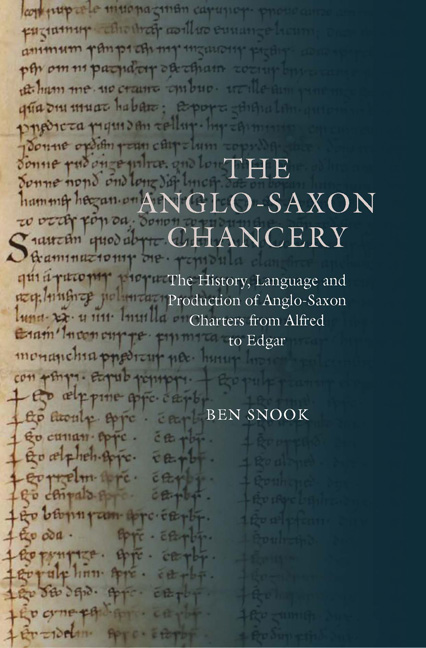 The Anglo-Saxon Chancery
The Anglo-Saxon Chancery Book contents
- Frontmatter
- Epigraph
- Contents
- Acknowledgements
- list of Abbreviations
- Timeline of Key Events between the Accession of Alfred and the Death of Edgar
- Introduction
- 1 Brave New World: The Charters of Alfred and Edward
- 2 Æthelstan
- 3 ‘Æthelstan A’
- 4 Turbulent Priests: Dunstan, Cenwald and Oda
- 5 Back to the Future: Edgar and ‘Edgar A’
- Conclusion
- Appendix I S 193
- Appendix II S 346
- Appendix III S 225
- Bibliography
- Index of charters
- Index
2 - Æthelstan
Published online by Cambridge University Press: 05 May 2015
- Frontmatter
- Epigraph
- Contents
- Acknowledgements
- list of Abbreviations
- Timeline of Key Events between the Accession of Alfred and the Death of Edgar
- Introduction
- 1 Brave New World: The Charters of Alfred and Edward
- 2 Æthelstan
- 3 ‘Æthelstan A’
- 4 Turbulent Priests: Dunstan, Cenwald and Oda
- 5 Back to the Future: Edgar and ‘Edgar A’
- Conclusion
- Appendix I S 193
- Appendix II S 346
- Appendix III S 225
- Bibliography
- Index of charters
- Index
Summary
In 937, just half a century after Alfred had been forced to flee into the marshes of the West Country after his forces had been overrun at Chippenham, his grandson, Æthelstan, scored a stunning victory over an alliance of Scots, Vikings and Strathclyde Britons at the Battle of Brunanburh, consolidating his position as Rex, not just Anglorum, but also, as his charters had been keen to remind their audience since the late 920s, totius Britanniae. It is fair to say that most of what we know about Æthelstan, from the composition of his court down to his daily itinerary, we only know because his charters tell us. At a time when the usual narrative sources became strangely threadbare, charters went in the opposite direction, providing an unparalleled annual record of where Æthelstan was, who was there with him, and what they were all doing. Moreover, they give us a unique understanding of how the king interpreted his office and of how he required it to be interpreted by others.
Perhaps it was because of the instability of Æthelstan's early years, the controversial nature of his accession and the hostility towards him that lingered in Wessex, that he established himself as king so emphatically at the end of the 920s. For him, the office of king became something it had never truly been before. no longer was he a king amongst kings. Now, Æthelstan was the king, the only king, ordained by god to rule not only amongst his people, but also over his nation and, much more importantly, over the island of Britain. his charters became the principal vehicle by which that message was disseminated.
However, Æthelstan was only able to put his charters to work as ideological tools because of the specific circumstances of their production. Throughout his reign charters were routinely produced by a royal writing office over which the king, or at least his public relations department, had direct control.
- Type
- Chapter
- Information
- The Anglo-Saxon ChanceryThe History, Language and Production of Anglo-Saxon Charters from Alfred to Edgar, pp. 57 - 85Publisher: Boydell & BrewerPrint publication year: 2015


